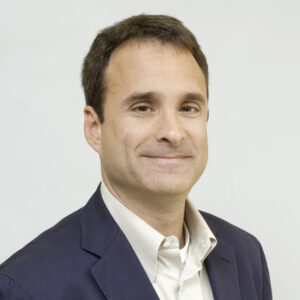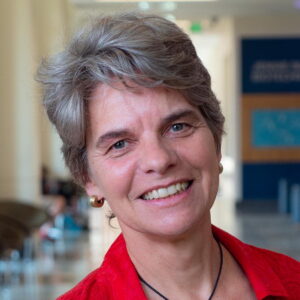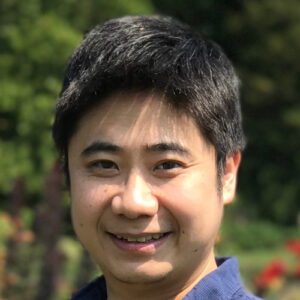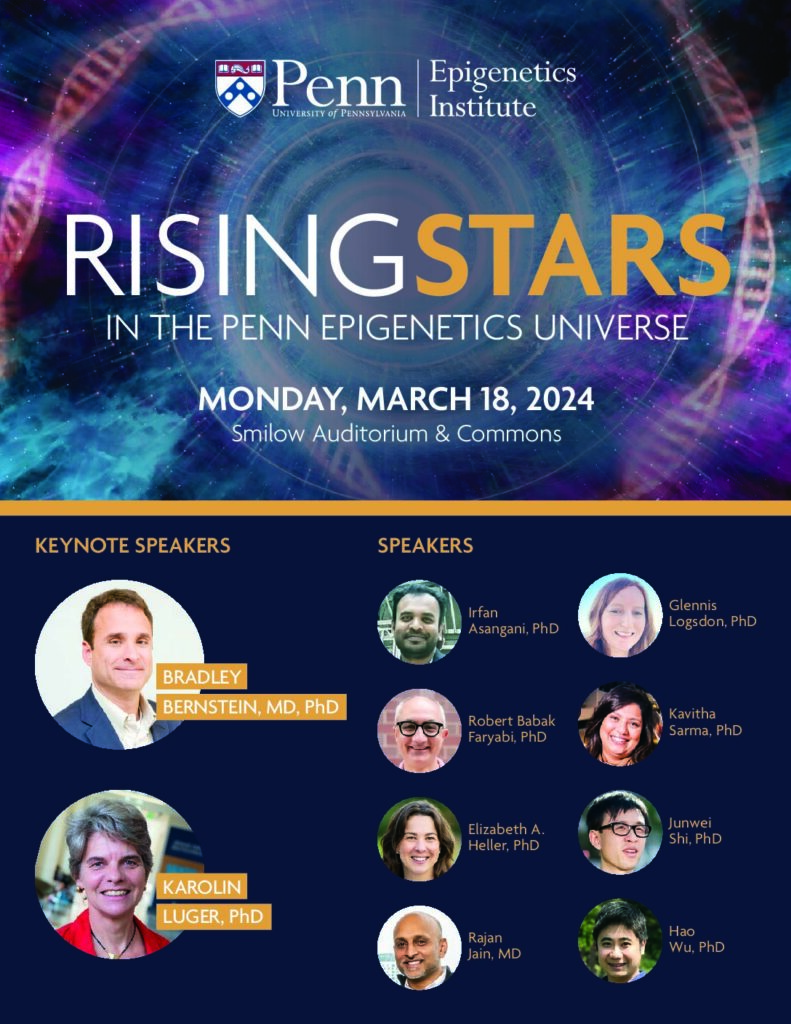Monday, March 18, 2024
Rubenstein Auditorium and Lobby
Smilow Center for Translational Research
Perelman School of Medicine, University of Pennsylvania
2024 Rising Stars in the Epigenetics Universe Symposium
KEYNOTE SPEAKERS

Bradley Bernstein, M.D, Ph.D.
Chair of Cancer Biology
Richard and Nancy Lubin Family Chair
Dana-Farber Cancer Institute
Professor of Pathology
Professor of Cell Biology
Harvard Medical School
https://cellbio.hms.harvard.edu/faculty-staff/bradley-bernstein
Bradley Bernstein, M.D., Ph.D. is the Chair of Cancer Biology at the Dana-Farber Cancer Institute, where he holds the Richard and Nancy Lubin Family Chair. He is also the Director of the Gene Regulation Observatory at the Broad Institute, a Professor of Pathology and a Professor of Cell Biology at Harvard Medical School, and an Investigator in Harvard’s Ludwig Institute.
Dr. Bernstein’s research focuses on epigenetic gene regulation. The Bernstein Lab studies how gene activity is controlled by noncoding regulatory elements such as ‘enhancers’, and by the way the genes are packaged into chromatin. His work is notable for the discovery of ‘bivalent domains’, a signature chromatin state consisting of opposing histone modifications that poise master genes for alternate fates. His characterization of bivalent chromatin and associated regulatory factors in stem cells was a key early demonstration of the mechanistic impact of chromatin on mammalian development. His subsequent work as a leader of the NIH’s ENCODE consortium revealed that the vast ‘noncoding’ portions of the human genome, which had previously been dismissed as ‘junk’, are in fact packed with sequence elements that control gene activity.
Dr. Bernstein’s second major area of contribution is cancer epigenetics. He showed that DNA methylation can activate oncogenes by disrupting genomic insulators, an entirely unexpected discovery given that methylation had been so closely tied to repression. This finding explains how certain tumors can sustain potent oncogenic signaling in the absence of canonical mutations. His group has also uncovered epigenetic mechanisms that underlie tumor cell self-renewal, drug tolerance and immune evasion.
Dr. Bernstein received his B.S. from Yale University in 1992 and his M.D. and Ph.D. from the University of Washington in 1999, before completing a residency in clinical pathology at Brigham and Women’s Hospital and postdoctoral research at Harvard University.

Karolin Luger, Ph.D.
Distinguished Professor
Jennie Smoly Caruthers Endowed Chair of Biochemistry
Investigator, Howard Hughes Medical Institute
University of Colorado, Boulder
https://www.colorado.edu/biochemistry/karolin-luger
Karolin Luger is a biochemist and structural biologist recognized for her work on chromatin structure and function. She was a key player in efforts to elucidate the three-dimensional structure of the nucleosome, the basic repeating unit in chromatin. Her more recent work has focused on how nucleosomes are recognized and assembled, and how nucleosome dynamics affect gene expression. Luger was born in Austria, and graduated with a degree in Biology and Microbiology from the University of Innsbruck, Austria. She did her PhD thesis in protein engineering and biophysics at the Biocenter in Basel, then moved to a postdoc at the ETH Zuerich in 1990. She started her independent career at Colorado State University in Fort Collins in 1999, where she continued her work on nucleosome and chromatin structure, and was recognized as a University Distinguished Professor in 2007. In 2015, she moved to the University of Colorado at Boulder, where she holds the Jennie Smoly endowed chair for Biochemistry. Luger is also an investigator for the Howard Hughes Medical Institute. She is a fellow of the Biophysical Society, and a member of the American Academy of Arts and Science, and of EMBO.
Research in the Luger Lab focuses on how nucleosomes and chromatin interfaces with the nuclear machineries that are responsible for gene expression, replication, and DNA repair. For example, her work has led to an understanding of how the herpes virus genome can ‘hitchhike’ on host chromosomes to escape destruction by the host defense mechanism, and how the posttranslational modifications of histones affect the structure and packing of nucleosomes. The group also investigates how nucleosomes are assembled and disassembled by a ‘histone chaperones’, and how DNA damage is signaled through the nucleus. This recent work impacts cancer therapies, as one of the proteins under investigation is a promising new drug target for certain cancers. The group has also suggested the potential evolutionary origin of nucleosomes, by visualizing the organization of chromatin in an ancient domain of life, the Archaea. The lab uses a wide range of techniques, such as X-ray crystallography, cryo-electron microscopy, fluorescence spectroscopy, atomic force microscopy, analytical ultracentrifugation, molecular biology, and life-cell imaging.
SCHEDULE
Click the arrow below to view the full schedule.
Toggle title
Rubenstein Auditorium and Lobby
Smilow Center for Translational Research
Perelman School of Medicine, University of Pennsylvania
3400 Civic Center Blvd
Philadelphia, PA 19104
Info
Introduction
Jonathan A. Epstein, MD
Shelley L. Berger, PhD
Genetic and epigenetic interplay in tumor progression
Keynote: Bradley Bernstein, MD, PhD
Epigenetic editing for the study of psychiatric disorders
Elizabeth A. Heller, PhD
Decoding gene regulatory roles of DNA hydroxymethylation
Hao Wu, PhD
EBF1 drives Enhancer-promoter Hubs in Lymphoma
R. Babak Faryabi, PhD
Lunch
Targeting Transcriptional Addiction in Cancer
Irfan Asangani, PhD
Epigenetic regulation through RNA-containing chromatin structures
Kavitha Sarma, PhD
Transcription and cohesin cooperatively direct locus 3D positioning
Rajan Jain, MD
Future of Academic Science Career Paths Panel
Maria Fasolino, PhD
Kahlilia Morris-Blanco, PhD
David C. Schultz, PhD
Parisha P. Shah, PhD
Break
Genome engineering and applications of CRISPR in primary cells
Junwei Shi, PhD
The complete genetic and epigenetic map of human centromeres
Glennis Logsdon, PhD
The rapidly expanding histone universe
Keynote: Karolin Luger, PhD
Closing Remarks
Reception
SPEAKERS

Irfan Asangani, Ph.D.
Associate Professor of Cancer Biology
Perelman School of Medicine, University of Pennsylvania
The Asangani Lab is affiliated with the Department of Cancer Biology at the Perelman School of Medicine, University of Pennsylvania, Philadelphia. The lab investigates how epigenetic regulators, such as chromatin modifying enzymes and chromatin-associated proteins, cooperate with transcription factors to orchestrate transcriptional addiction in cancer cells. They aim to translate this knowledge into clinical tools by developing novel diagnostic, prognostic, and therapeutic strategies.

R. Babak Faryabi, Ph.D.
Perelman School of Medicine, University of Pennsylvania
R. Babak Faryabi is currently an Associate Professor of Pathology and Cancer Biology at the Perelman School of Medicine, University of Pennsylvania. Babak received his bachelor and master of science degrees from Sharif University of Technology in Iran. He then moved to Texas A&M University, where he received his Ph.D. in computational biology under the supervision of Drs. Edward Dougherty and Jean-Francois Chamberland. Babak then joined the laboratory of Dr. Andre Nussenzweig at the NIH as a postdoctoral fellow to study the mechanisms of epigenetic dysregulation in B cell lymphomas. As an independent investigator, Babak uses systems-based approaches to understand molecular underpinning of genome folding and transcriptional addiction in cancer. He is the recipient of a number of awards including the Susan G. Komen Foundation Career Catalyst Research Award, Cooper Scholar Award, and Concern Foundation Conquer Cancer Now Award. He serves as an Associate Editor of Breast Cancer Research journal.

Elizabeth A. Heller, Ph.D.
Associate Professor of Pharmacology
Perelman School of Medicine, University of Pennsylvania

Rajan Jain, M.D.
Perelman School of Medicine, University of Pennsylvania
Rajan Jain leads a research team of students, physicians and scientists with the overarching mission to understand how cellular identity is achieved and maintained in health and altered in disease. Prior to starting his independent program, Rajan earned a BA from the University of California, Berkeley, an MD from NYU School of Medicine, and completed internal medicine residency and cardiology fellowship at Penn Medicine.
The Jain lab seeks to decipher the rules that govern three-dimensional organization of the genome. His team has shown that spatial positioning of the genome in the nucleus is essential for cardiac progenitor cell lineage restriction and contributes to cardiac disease. They have extended these studies to discover molecular mechanisms that choreograph genome folding to regulate fate determination. The team is unraveling how these processes regulate stemness in progenitor cells across a multitude of tissues. These findings provide a mechanistic framework to understand how human mutations in epigenetic factors may cause disease, supporting the laboratory’s goal to reveal how three-dimensional genome organization safeguards cellular identity. The impact of the team’s work has been recognized by the Burroughs Wellcome Foundation, Allen Foundation, and NIH Office of the Director (New Innovator Award and Transformative Research Award). Beyond the lab, Rajan is actively involved in local and national efforts to identify, recruit, train and promote the next generation of physician-scientists. He is clinically active as a general cardiologist and primarily cares for patients in the CCU. Rajan was the recipient of the ASCI’s Seldin-Smith Award for Pioneering Research in 2021.

Glennis Logsdon, Ph.D.
Assistant Professor of Genetics
Perelman School of Medicine, University of Pennsylvania
Dr. Logsdon is an Assistant Professor in the Department of Genetics and a Core Member of the Epigenetics Institute at the University of Pennsylvania Perelman School of Medicine. She performed her postdoctoral training at the University of Washington School of Medicine with Dr. Evan Eichler, where she studied the sequence, structure, and evolution of human centromeres using long-read sequencing and computational approaches. Before that, she obtained her Ph.D. in Biochemistry and Molecular Biophysics in 2018 from the University of Pennsylvania Perelman School of Medicine, where she studied centromere establishment on human artificial chromosomes with Dr. Ben Black. She is involved in several national consortia, including the Telomere-to-Telomere (T2T) consortium, Human Pangenome Reference Consortium (HPRC), and Human Genome Structural Variation Consortium (HGSVC). She also works with non-profit, patient-led organizations, such as Project 8p, to better understand complex structural variation in the human genome.

Kavitha Sarma, Ph.D.
The Wistar Institute
Dr. Sarma joined The Wistar Institute in 2016 in the Gene expression and regulation program. She is also a core member of the Epigenetics Institute at the University of Pennsylvania. Dr. Sarma is an expert in both chromatin and non-coding RNA biology, having extensively studied eukaryotic gene regulation and mammalian dosage compensation. Dr. Sarma completed her graduate studies with a Ph.D. in biochemistry from Rutgers University and conducted her postdoctoral training at the Massachusetts General Hospital-Harvard Medical School. In 2017, Dr. Sarma was awarded the NIH New Innovator Award to explore the functions of RNA containing chromatin structures called R-loops. Her laboratory currently explores RNA function in epigenetic gene regulation and in the formation of atypical chromatin structures in disease.

Junwei Shi, Ph.D.
The Shi Lab focuses on discovering and dissecting disease-essential transcriptional and epigenetic regulatory pathways, to leverage this knowledge to develop novel therapeutic strategies. They develop next-generation genome engineering tools. These include base editors, in vivo CRISPR-based gene editing platforms, and multiplexed Cas12a systems, all geared towards drug target discovery and facilitating genetic and molecular mechanistic studies. The lab’s two primary research focuses are: (1) Investigating how epigenetic dysregulation contributes to the pathogenesis of acute myeloid leukemia (AML), and exploring epigenetic regulators, transcription factors, and kinase signaling pathways as potential therapeutic targets in AML; and (2) Developing advanced genome editing and high-throughput genetic screening biotechnologies to identify new therapeutic targets.

Hao Wu, Ph.D.
DNA cytosine methylation (5-methylcytosine) is an evolutionarily conserved epigenetic mark and has a profound impact on transcription, development and genome stability. Historically, 5-methylcytosine (5mC) is considered as a highly stable chemical modification that is mainly required for long-term epigenetic memory. The recent discovery that ten-eleven translocation (TET) proteins can iteratively oxidize 5mC in the mammalian genome represents a paradigm shift in our understanding of how 5mC may be enzymatically reversed. It also raises the possibility that three oxidized 5mC bases generated by TET may act as a new class of epigenetic modifications.
Our laboratory uses high-throughput sequencing technologies, bioinformatics, mammalian genetic models, as well as synthetic biology tools to investigate the mechanisms by which proteins that write, read and erase oxidized 5mC bases contribute to mammalian development (particularly cardiovascular and neural lineages) and relevant human diseases. To achieve this goal, we are also interested in developing new genomic sequencing and programmable epigenome-modifying methods to precisely map and manipulate these DNA modifications in the complex mammalian genome.

